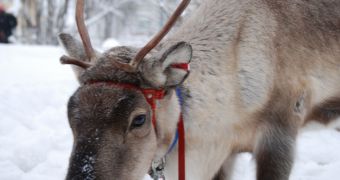Scientists have recently discovered that reindeer living in the Arctic really have not much use for a circadian rhythm to help them cope with the night and day cycle. And the reason for this is fairly simple – there are no days or nights at their location, just six months of dark, followed promptly by six months of sunlight. In such circumstances, experts say, having an active day-night rhythm could be detrimental, rather than helpful, Wired reports. According to a growing number of experts, this type of environmental adaptation could exist in numerous Arctic species, precisely to help them cope with the unusual circumstances of their respective areas.
“If you are being driven through a subjective day and night by an internal timer, you may be in ‘night mode’ when the optimal conditions for foraging are present. So it may be a disadvantage to have such a strong timer in such an environment,” explains Norwegian biologist Karl-Arne Stokkan, who is based at the University of Tromso. He is also the coauthor of a new paper detailing the findings, which appears in the March 11 issue of the respected scientific publication Current Biology. Experts explain that the brain of all animals feature the circadian clock, and that the “instrument” is located in the hypothalamus.
Its primary goal is to dictate when that particular creature should be active, and when it should rest. In humans, the function of the clock can be somewhat inhibited for a certain period of time, by using stimulants such as caffeine. But most other animals go to sleep and wake up according to the direct instructions of this mechanism. It has evolved over generations so that the creatures are awake precisely when they need to be so that they have the highest chance of encountering their favorite pray. According to University of Massachusetts neurologist William Schwartz, in most animals the clock resets itself every 24-hour, which keeps it in tune with the length of an Earth day.
“The general assumption is that clocks are ubiquitously present and that they are extremely important for the normal functioning of the organism,” Stokkan says. Experts have discovered that one of the primary methods through which the clock functions is by releasing surges of the hormone melatonin at dusk, and by absorbing a lot of the stuff at dusk. Other hormones are also regulated by the clock, but experts have yet to understand the complexity of the mechanisms involved in how this instrument coordinates and supports the sleep-wakefulness cycle.
In the case of reindeer, it would appear that their dietary needs have promoted adaptations of their inner clocks. “Because of their digestive system – something special to reindeer – they’re not going to do well if they just eat at a certain time of day. They really have to be grazing every couple of hours,” explains Schwartz.

 14 DAY TRIAL //
14 DAY TRIAL //